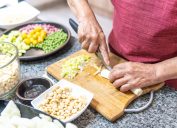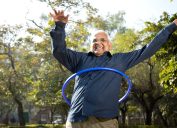World's Longest-Living Family Reveals the Lunch They Eat Every Day
This powerhouse meal could be the key to their longevity.
If your goal is to live a long, healthy life, one of the best ways to begin is by looking to those who have already beaten the odds. At least that's what Dan Buettner, an award-winning journalist, New York Times bestselling author, and National Geographic Explorer believes.
Buettner has been traveling the globe for the past two decades in search of the keys to longevity. In 2004, the author began identifying "Blue Zones"—regions of the world in which residents boast longer-than-average lifespans—and finding out what makes these areas the health hotspots that they are. Not only do people in these communities live longer, but they also enjoy longer "healthspans," meaning they have more years of living free from illness or disability, compared with people living in other regions.
RELATED: 115-Year-Old Woman Reveals the Secret of Her Longevity Diet.
Recently, Buettner highlighted the story of the Melis family, who once held the Guinness World Record as "the longest-living family in the world." Among nine siblings, they have a collective age of 861, meaning they have an average age of 95 and counting. The oldest sibling in the Sardinia-based cohort is 109 years old, Buettner notes.
Besides sharing favorable genes, the researcher says that the family members all have something else in common that could help explain their exceedingly long lives. Every day, they eat the same thing for lunch: sourdough bread, a three-bean minestrone soup, and a small, two- to three-ounce glass of red wine.
"This wasn't because 'my diet requires me to do it,'" he explains in the video. "No, they loved it."
Buettner notes that their three-bean soup recipe contains garbanzo beans, pinto beans, and white beans, along with a variety of garden-fresh vegetables and whole grain pasta.
"In every blue zone I have visited, beans and other legumes were—and still are—a major component of the daily diet," the longevity expert told CNN.
RELATED: 117-Year-Old Woman Ate the Same Thing Every Day Since WWI.
Research supports the hypothesis that beans and legumes can lengthen your lifespan. In fact, a surprising 2004 study found that people experienced a seven to eight percent reduction in mortality for every 20-gram increase in their daily intake of beans and legumes.
The benefits are most likely the result of the high fiber content found in this particular food group. Besides cutting cholesterol and stabilizing blood sugar, "fiber rewards you with a healthy gut microbe and lower inflammation and better immune function," explains Buettner.
Beans and legumes are also a robust source of vitamins and nutrients, including protein, copper, iron, magnesium, potassium, folic acid, and zinc. "Only five percent to 10 percent of Americans get the fiber they need," Buettner notes.
Beans may also be especially effective in promoting longevity when they replace animal-derived sources of protein. The Blue Zones site recommends eating a diet that is 95 to 100 percent plant-based. If you choose to include meat and dairy products, you should consume these only sparingly, the longevity experts behind the site say.
The Melis family's three-bean minestrone soup recipe is now available on the Blue Zones website.






















